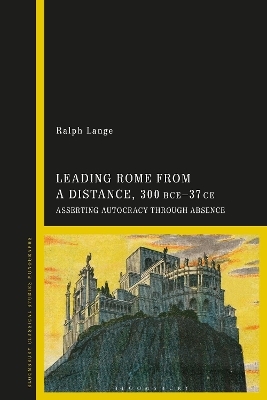
Leading Rome from a Distance, 300 BCE–37 CE
Asserting Autocracy through Absence
Seiten
2024
Bloomsbury Academic (Verlag)
978-1-350-32540-1 (ISBN)
Bloomsbury Academic (Verlag)
978-1-350-32540-1 (ISBN)
Roman political leaders used distance from Rome as a key political tool to assert pre-eminence.
Through the case studies of Caesar’s hegemony, Augustus’s autocracy, and Tiberius’s reign, this book examines how these figures’ experiences and manipulations of absence established a multipolar focus of political life centred less on the city of Rome, and more on the idea of a single leader.
The Roman expansion over Italy and the Mediterranean put the political system under considerable stress, and eventually resulted in a dispersal of leadership and a decentralization of power. Absent generals rivalled their peers in Rome for influence and threatened to surpass them from the provinces. Roman leaders, from Sulla to Tiberius, used absence as a mechanism to act autonomously, but it came at the cost of losing influence and control at the centre. In order to hold influence while being split off from the decision-making powers of the geographical nucleus that was Rome, communication channels to mitigate necessary absences were developed during this period, such as travel, intermediate meetings, letters (propaganda writings) and a complex network of mediators, ultimately forming the circle from which the imperial court emerged. Absent leadership, as it developed throughout the Late Republic, a hitherto neglected issue, eventually became a valuable asset in the institutionalising process of the autocracy of Caesar, Augustus, and Tiberius.
Through the case studies of Caesar’s hegemony, Augustus’s autocracy, and Tiberius’s reign, this book examines how these figures’ experiences and manipulations of absence established a multipolar focus of political life centred less on the city of Rome, and more on the idea of a single leader.
The Roman expansion over Italy and the Mediterranean put the political system under considerable stress, and eventually resulted in a dispersal of leadership and a decentralization of power. Absent generals rivalled their peers in Rome for influence and threatened to surpass them from the provinces. Roman leaders, from Sulla to Tiberius, used absence as a mechanism to act autonomously, but it came at the cost of losing influence and control at the centre. In order to hold influence while being split off from the decision-making powers of the geographical nucleus that was Rome, communication channels to mitigate necessary absences were developed during this period, such as travel, intermediate meetings, letters (propaganda writings) and a complex network of mediators, ultimately forming the circle from which the imperial court emerged. Absent leadership, as it developed throughout the Late Republic, a hitherto neglected issue, eventually became a valuable asset in the institutionalising process of the autocracy of Caesar, Augustus, and Tiberius.
Ralph Lange is an Independent Scholar, Luxembourg. He works as Assistant Curator at the Documentation Centre for the Fortress of Luxembourg at the National Museum of Archaeology, History and Art (MNAHA), Luxembourg.
Introduction
1. Dealing with distance: The impact of res militares (300-49 BCE)
2. Caesar: The Taming of Distance 87-44
3. Augustus: Autocracy through Absence 44 BCE-14 CE
4. Tiberius: The Tyranny of Distance 14-37 CE
Conclusion: The Commanding Space
Notes
Bibliography
Index
| Erscheinungsdatum | 29.10.2024 |
|---|---|
| Verlagsort | London |
| Sprache | englisch |
| Maße | 156 x 234 mm |
| Themenwelt | Literatur ► Klassiker / Moderne Klassiker |
| Geschichte ► Allgemeine Geschichte ► Vor- und Frühgeschichte | |
| Geisteswissenschaften ► Sprach- / Literaturwissenschaft ► Anglistik / Amerikanistik | |
| Geisteswissenschaften ► Sprach- / Literaturwissenschaft ► Literaturwissenschaft | |
| ISBN-10 | 1-350-32540-6 / 1350325406 |
| ISBN-13 | 978-1-350-32540-1 / 9781350325401 |
| Zustand | Neuware |
| Informationen gemäß Produktsicherheitsverordnung (GPSR) | |
| Haben Sie eine Frage zum Produkt? |
Mehr entdecken
aus dem Bereich
aus dem Bereich
Was Pompeji über uns erzählt
Buch | Hardcover (2023)
Propyläen (Verlag)
CHF 44,75
auf den Spuren der frühen Zivilisationen
Buch | Hardcover (2023)
C.H.Beck (Verlag)
CHF 27,95


